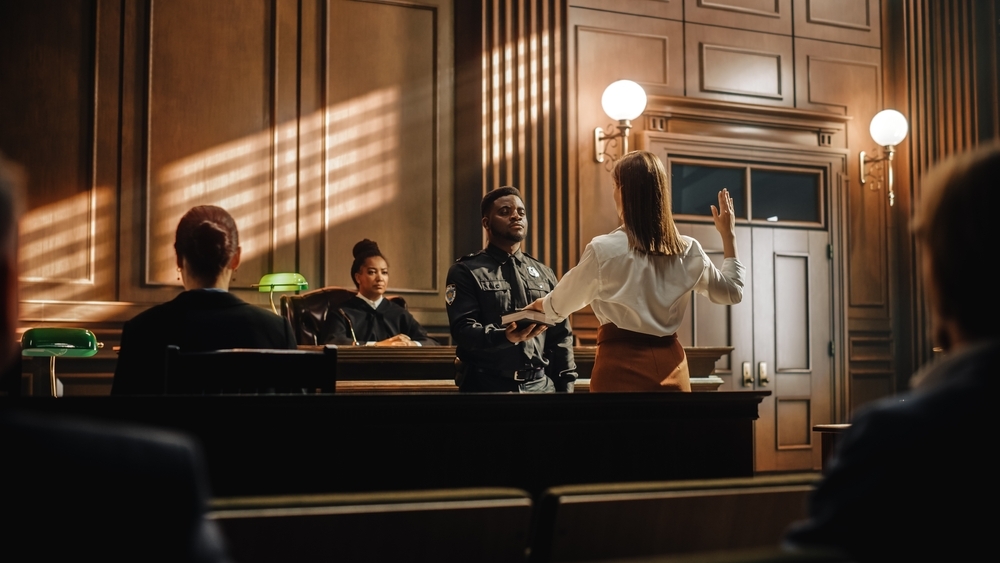
Domestic violence cases in California are complicated, emotional, and often misunderstood. One of the most common questions people ask is whether their spouse can refuse to testify against them. Many believe the case will simply disappear if the spouse does not want to participate. Unfortunately, the reality is much more complex. California law gives prosecutors broad authority to move forward even without a spouse’s cooperation, especially in cases involving alleged violence inside the home.
If you or someone you care about is facing domestic violence charges, understanding how spousal privilege works and how courts treat uncooperative witnesses can help you make informed decisions. The well-known United States Supreme Court decision in Crawford v. Washington also plays an important role in determining what evidence can be used if your spouse refuses to testify.
California’s Spousal Privilege: What It Does and Does Not Protect
California recognizes a type of protection known as the spousal testimonial privilege. In basic terms, a spouse cannot be forced to testify against their partner in most criminal cases. However, this privilege has several major exceptions. Most importantly, California law does not allow a spouse to refuse to testify in cases involving:
- Domestic violence
- Child abuse
- Crimes committed against the spouse
- Crimes committed against a member of the household
When a case falls into one of these categories, the privilege does not apply. That means the prosecutor can subpoena the spouse, place them under oath, and require them to testify.
Many people are surprised to learn that the spouse does not get to decide whether the privilege applies. The court determines that. If the judge rules the privilege does not apply, the spouse must testify unless a different legal protection applies.
Similar Post: Can a California Court Make Pet Visitation Orders If a DVRO Petition Is Denied?
Why Prosecutors Can Still Move Forward Without Your Spouse’s Cooperation
Even if your spouse refuses to testify or tries to change their story, prosecutors in California routinely proceed with domestic violence cases. They may rely on several forms of evidence, including:
- 911 recordings
- Body-worn camera footage
- Statements made to police at the scene
- Photos of alleged injuries
- Medical records
- Witness statements from neighbors, friends, or children
- Past reports of domestic disputes
Prosecutors take domestic violence cases very seriously. When they believe there is independent evidence of a crime, they may try to move forward even if the spouse wants the case dismissed.
Why Crawford v. Washington Matters in Domestic Violence Cases
The United States Supreme Court’s decision in Crawford v. Washington (2004) changed how courts handle out-of-court statements in criminal cases. In Crawford, the Court ruled that testimonial statements made by a witness who does not testify at trial cannot be introduced unless the defendant had a previous opportunity to cross-examine that witness.
This rule protects the defendant’s Sixth Amendment right to confront their accuser.
However, the key question in domestic violence cases is whether the spouse’s statements are considered testimonial or non-testimonial:
- Testimonial statements include formal statements made to police officers during questioning.
- Non-testimonial statements include spontaneous statements made during an emergency, especially when the primary purpose is to get help, not provide evidence.
This distinction is extremely important. For example:
- If your spouse calls 911 while scared and seeking immediate help, the recording may be considered non-testimonial and admissible even if your spouse refuses to testify.
- If your spouse later gives a detailed statement to an officer after the situation has calmed down, that statement may be considered testimonial. Under Crawford, the prosecution may not be able to use it unless your spouse testifies at trial.
Because domestic violence cases often involve both types of statements, a skilled criminal defense attorney must carefully examine every statement to determine what the prosecution can legally use.
Similar Post: California Launches New Pilot Program Allowing Prosecutors to Seek Gun Violence Restraining Orders
What Happens If Your Spouse Refuses to Testify
If your spouse does not want to testify, several things may happen depending on the specifics of the case.
1. The Prosecutor May Compel Testimony
When spousal privilege does not apply, the prosecutor can subpoena your spouse. If the spouse ignores the subpoena, the court may issue a bench warrant and bring them to court.
2. The Prosecution May Rely on Other Evidence
Even without live testimony, prosecutors may try to use:
- Photos
- Medical documents
- Officer observations
- Statements considered non-testimonial under Crawford
Whether these are admissible depends on the circumstances and how the statements were made.
3. The Case May Become Weaker or More Difficult to Prove
A spouse who refuses to testify can make the prosecution’s job harder. If Crawford prevents them from using certain statements, the case may lose its foundation. This often creates opportunities for defense attorneys to challenge the charges, negotiate a better outcome, or even seek a dismissal.
How a Defense Attorney Can Challenge the Case
Domestic violence cases require careful analysis of the evidence. An attorney may be able to:
- Argue that key statements are testimonial and inadmissible
- Challenge the legality of the arrest
- Review whether the police gathered evidence properly
- Question whether the alleged injuries match the reports
- Examine inconsistencies in the spouse’s statements
- Seek suppression of evidence under Crawford and related cases
A strong defense focuses on weakening the prosecution’s case until there is reasonable doubt about what actually happened.
Do Charges Always Get Dropped When the Spouse Is Uncooperative?
No. This is one of the biggest misconceptions. California prosecutors handle domestic violence cases with the understanding that many spouses may change their minds or refuse to testify. Because of this, prosecutors often continue the case even when the spouse asks for dismissal.
However, the spouse’s refusal to testify may still help your defense, especially if key evidence depends on their statements.
Why You Should Avoid Contacting Your Spouse About the Case
If a protective order was issued, contacting your spouse can lead to additional criminal charges. Even if your spouse wants the charges dropped, you must follow all court orders until your attorney advises otherwise. Violating an order can hurt your case and damage your credibility in court.
Call The Law Offices of Christopher Chaney for Help With a Domestic Violence Case in Los Angeles
If your spouse refuses to testify against you in a California domestic violence case, you may still face serious charges. You should not try to navigate the legal system alone. The Law Offices of Christopher Chaney can review the evidence, analyze whether Crawford v. Washington applies, and build a strategic defense to protect your rights.
Contact the firm today at 818-330-5198 for a confidential consultation so you can understand your options, safeguard your freedom, and move forward with confidence. We represent clients throughout California, including Los Angeles, Westwood, and South Bay.
Disclaimer: This blog is intended for informational purposes only and does not establish an attorney-client relationship. It should not be considered as legal advice. For personalized legal assistance, please consult our team directly.





